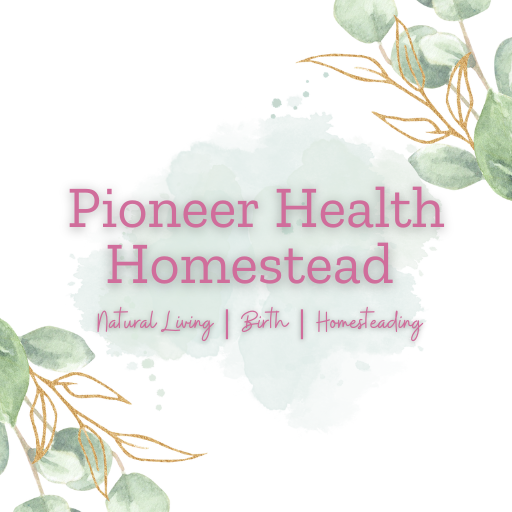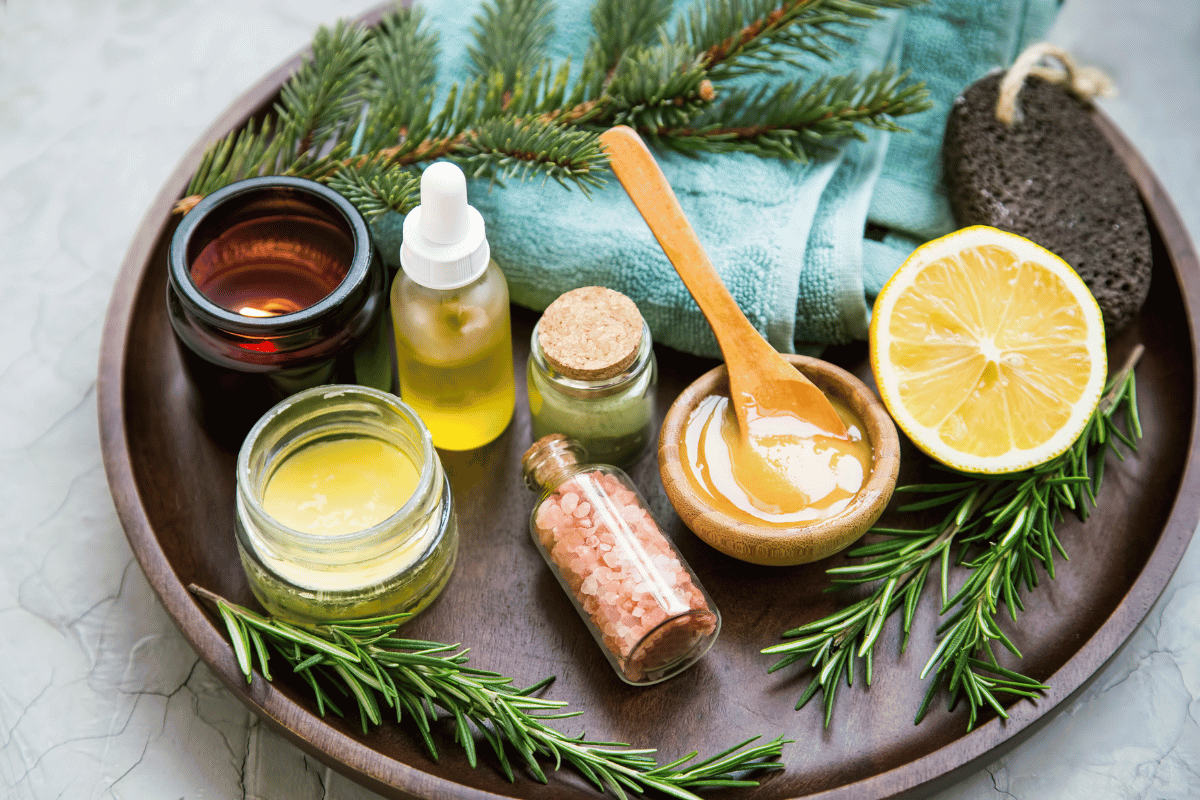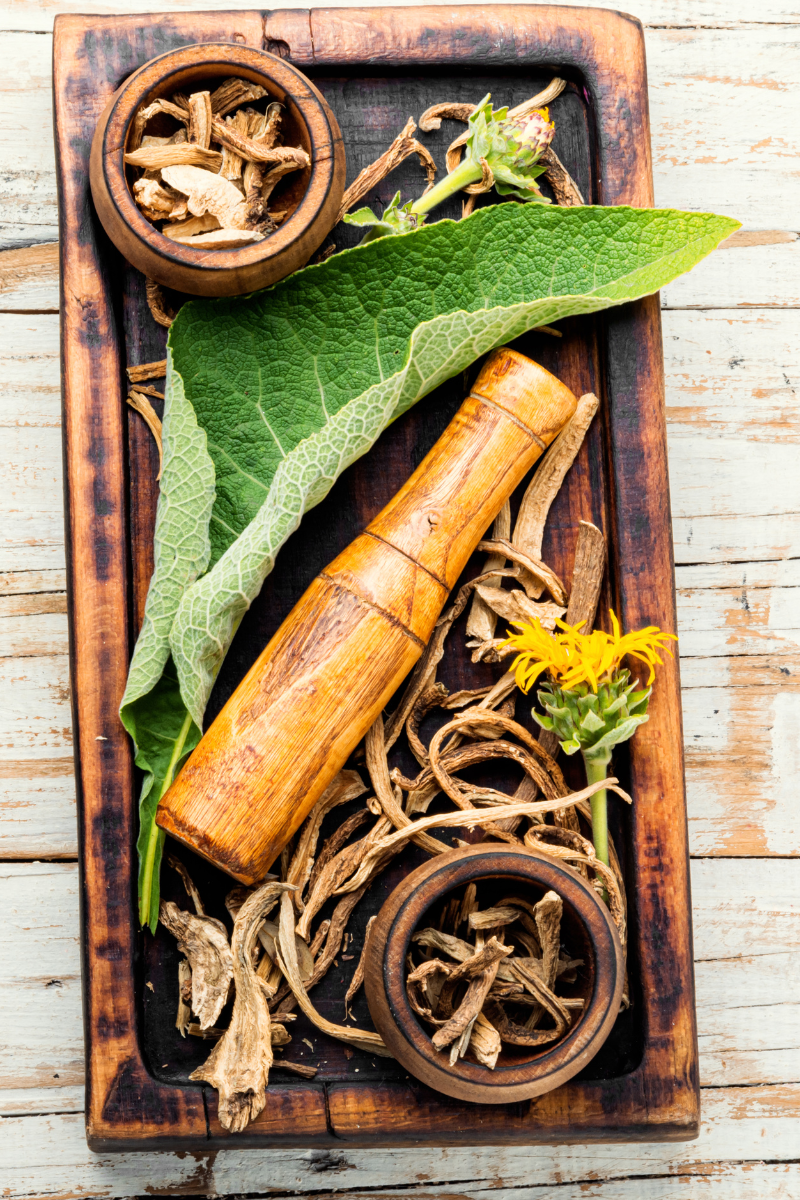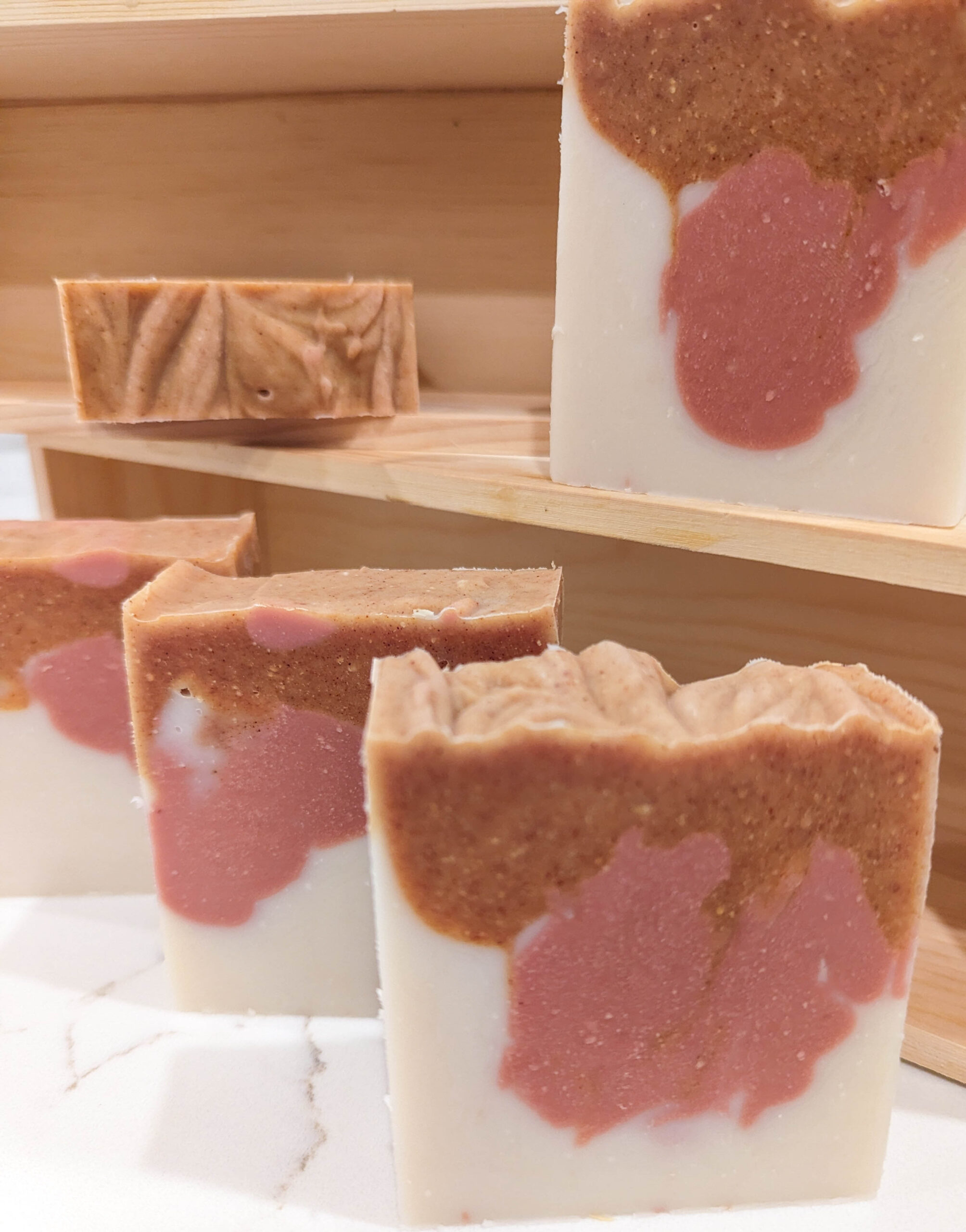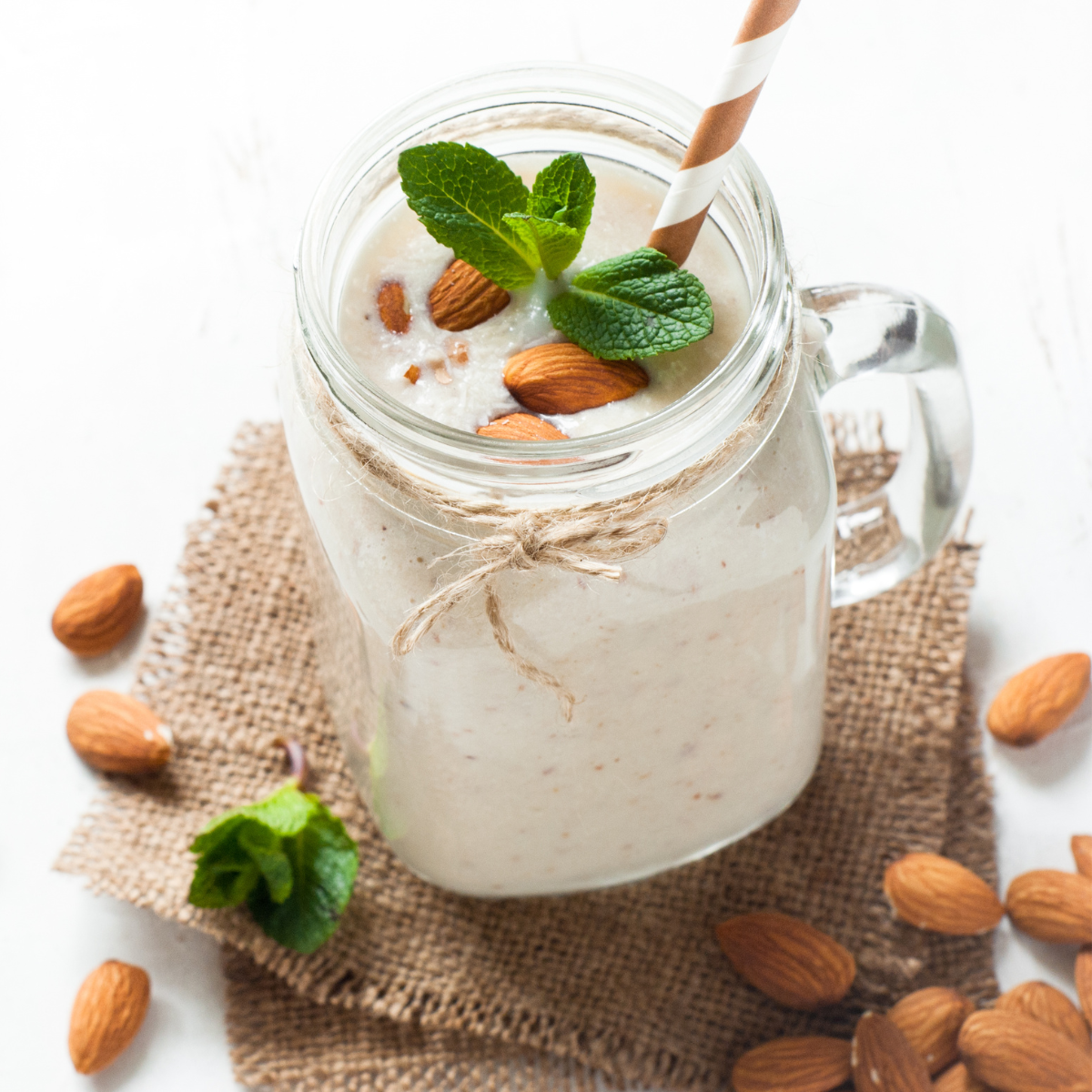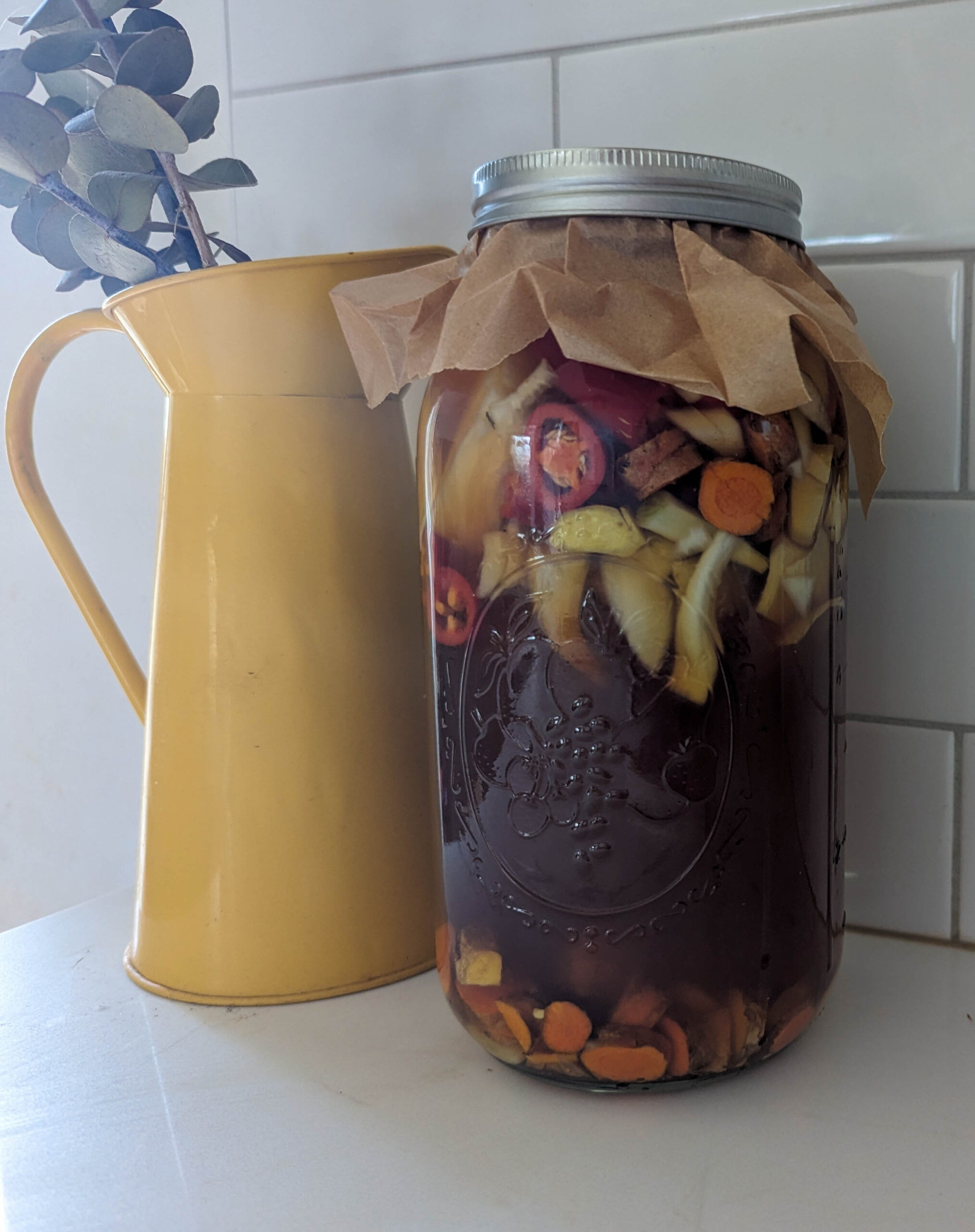Best Herbs for the Endocrine System: Hormone Balance & Support
The best herbs for the endocrine system will help to heal, manage, and maintain a healthier life. The human body is complex with many different systems working harmoniously to keep us healthy and functioning, in homeostasis. One such system, often overlooked but crucial to our well-being, is the endocrine system. This intricate network of glands and hormones orchestrates a delicate balance of functions that regulate everything from metabolism to your mood to maintain good health.
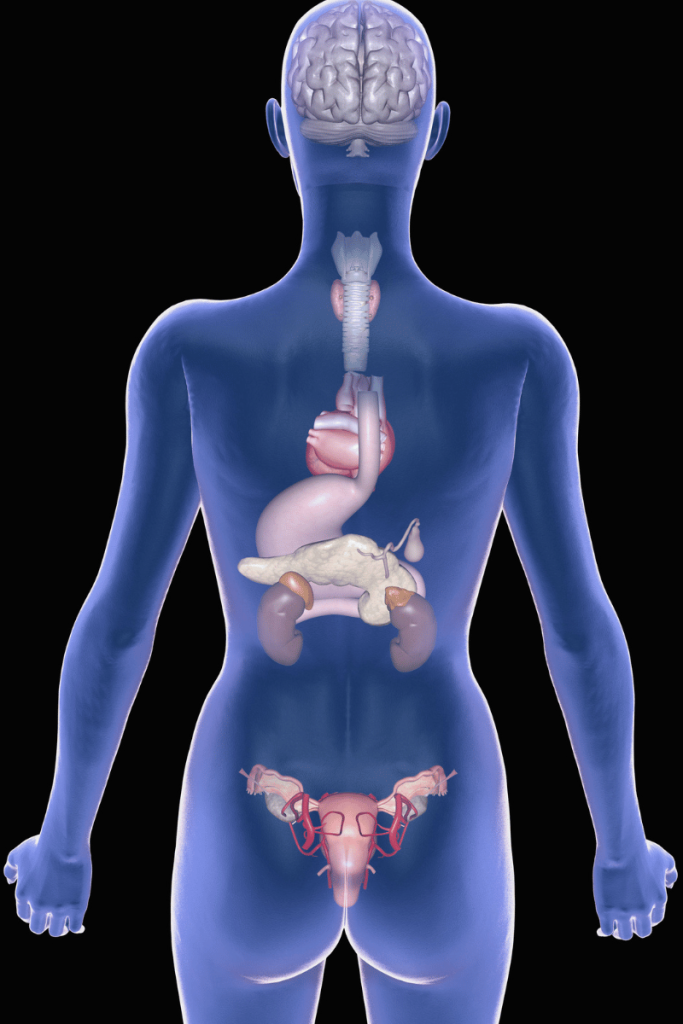
What is the Endocrine System?
The endocrine system is a collection of glands that produce and secrete hormones, chemical messengers that travel through the bloodstream to various organs and tissues in the body. These hormones play a vital role in regulating numerous bodily functions, including growth and development, metabolism, sexual function, and mood.
The Role of Hormones
Hormones are like the body’s internal messengers, transmitting signals that control how our cells and organs function. They regulate everything from our sleep-wake cycle to our stress response, and even our ability to reproduce. For example, the thyroid gland produces hormones that regulate metabolism, while the adrenal glands release hormones that help us respond to stress.
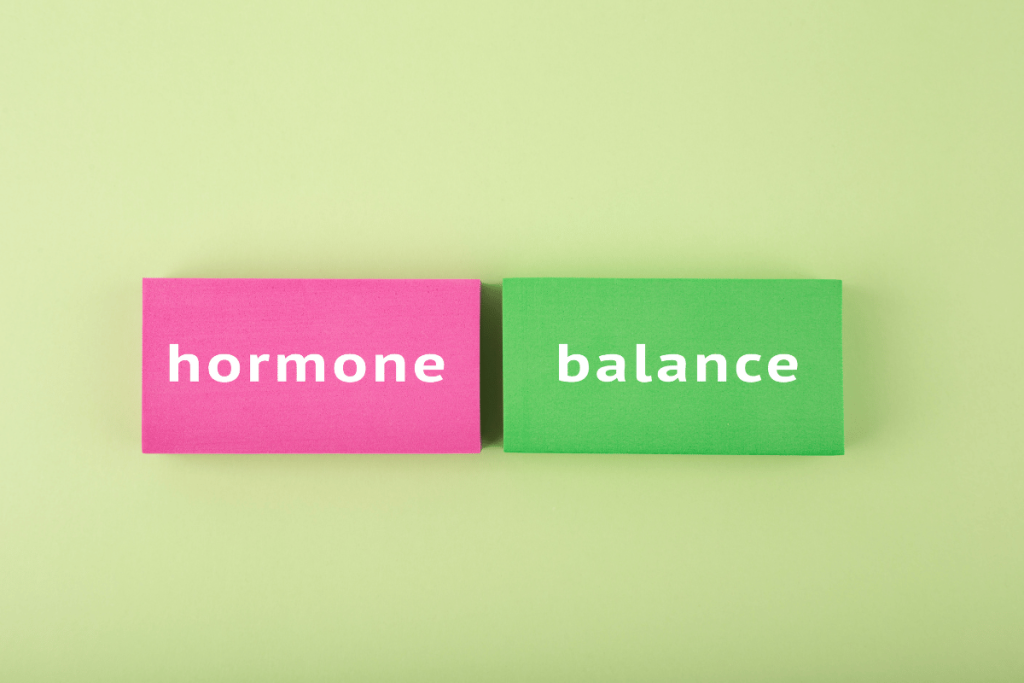
Key Glands of the Endocrine System
The endocrine system includes several glands, each with its specific functions. Some of the most important glands include:
Hypothalamus
This small region of the brain acts as the control center for the endocrine system, releasing hormones that stimulate or inhibit the release of other hormones from the pituitary gland.
Pituitary gland
Often called the “master gland,” the pituitary gland produces hormones that regulate other glands in the endocrine system, as well as growth hormones and hormones that control the menstrual cycle.
Thyroid gland
Located in the neck, the thyroid gland produces hormones that regulate metabolism and energy levels.
The adrenal glands
These glands, located on top of the kidneys, produce hormones that help the body respond to stress, regulate blood pressure, and maintain salt and water balance.
Pancreas
This gland produces insulin, a hormone that helps regulate blood sugar levels.
Maintaining a Healthy Endocrine System
A healthy endocrine system is essential for overall well-being. To keep your endocrine system in balance, it’s important to:
Eat a balanced diet

A diet rich in fruits, vegetables, whole grains, and lean proteins can help support hormone production and regulation.
Get regular exercise
Physical activity can help regulate hormone levels and improve overall health.
Manage stress
Chronic stress can disrupt hormone balance, so finding healthy ways to manage stress is crucial.
Get enough sleep
Adequate sleep is essential for hormone regulation and overall health.
The Power of Herbs for the Endocrine System
In addition to lifestyle factors, certain herbs can also support the health of the endocrine system. Here are four types of herbs that are particularly beneficial.
1. Adaptogen Herbs
Adaptogens are a class of herbs that help the body adapt to stress, and maintain balance and are considered tonics. These are the best class of herbs for the endocrine system. They can support the adrenal glands, which play a key role in the body’s stress response.
Effective adaptogenic herbs include ashwagandha, borage, eleuthero, holy basil, rhodiola, and schizandra.
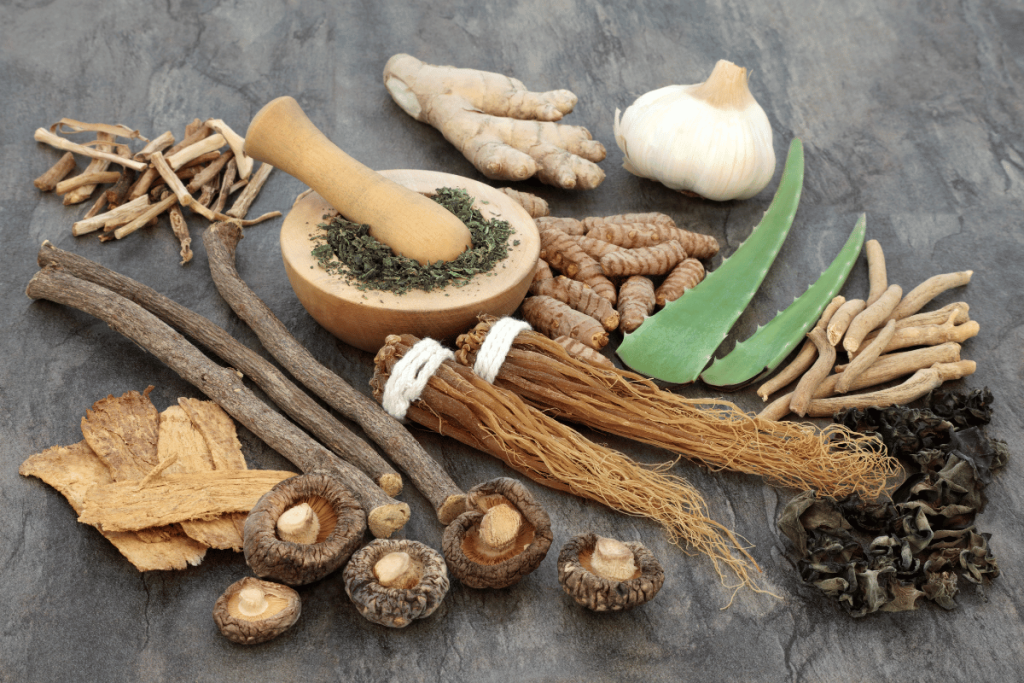
2. Bitter Herbs
Bitter herbs help the body to increase the production of hormones when an underproduction is the root of the problem, and vice versa, they decrease production when overproduction happens. An example is hypothyroidism, which is the under-functioning of the thyroid gland. Other ailments include hyperthyroid (overactive) which is an overproduction of the thyroid hormones. Bitter herbs can support the digestive system, which is closely linked to the endocrine system. They can help improve digestion (get everything moving) and nutrient absorption, which in turn can support hormone balance.
Examples of bitter herbs include barberry, boneset, bugleweed, dandelion root, gentian, goldenseal, hops, horehound, wormwood, and yarrow.
3. Alterative Herbs
Alterative herbs are thought to help “cleanse” the blood and support the body’s natural detoxification processes. This can help to promote proper blood functionality. They can support the liver, which plays a key role in hormone metabolism. These herbs are best when used long-term because they tend to work slowly and gradually over time.
Effective alterative herbs include burdock root, cleavers, dandelion root, Oregon grape, red clover, sarsaparilla, and yellow dock.
4. Nervine Herbs
Nervine herbs can support the nervous system, which is closely linked to the endocrine system. They can help promote relaxation and reduce stress, which in turn can support hormone balance. Nervines also fortify frayed nerve endings that result from chronic stress and unrest, which usually incorporate higher cortisol levels within the body. High cortisol levels can cause damage over time.
Examples of nervine herbs include chamomile, lemon balm, lavender, oatstraw, passionflower, wood betony, skullcap, St. John’s wort, and vervain.
By understanding how this complex system works and taking steps to support its function, we can help ensure that our bodies continue to function at their best. Incorporating adaptogen, bitter, alterative, and nervine herbs into your routine can be a natural and effective way to support your endocrine system and promote overall well-being.
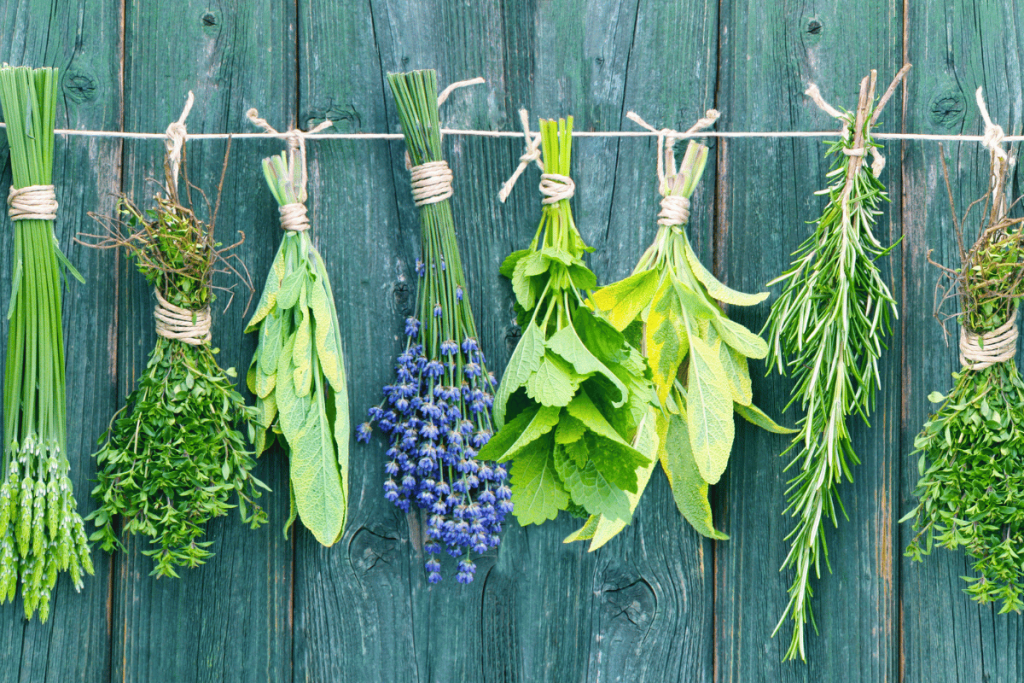
Historical Use of Herbs in Traditional Medicine
Throughout history, herbs have been integral to traditional medicine practices across cultures worldwide. Ancient civilizations relied on the healing properties of plants to address various ailments, including those related to the endocrine system. Traditional healers and herbalists carefully studied the effects of different herbs and passed down their knowledge through generations.
For example, in Ayurvedic medicine, herbs like ashwagandha and holy basil have been used for centuries to support endocrine health and promote overall well-being. Similarly, Traditional Chinese Medicine (TCM) incorporates herbs such as ginseng and licorice root to support hormonal balance. The rich history of herbal medicine serves as a testament to the profound impact these natural remedies can have on human health.
Scientific Evidence Supporting the Efficacy of Herbs for Endocrine Health
In recent years, scientific research has begun to shed light on the mechanisms behind the therapeutic effects of herbs on the endocrine system. Numerous studies have investigated the efficacy of specific herbs in regulating hormone levels, improving gland function, and addressing endocrine disorders.
Research has shown that adaptogen herbs like ashwagandha and rhodiola can help modulate the body’s stress response and support adrenal function, thereby promoting hormonal balance. Additionally, studies have demonstrated the potential of herbs such as fenugreek and cinnamon to improve insulin sensitivity and regulate blood sugar levels, making them valuable in managing conditions like diabetes.
Furthermore, clinical trials have highlighted the benefits of herbal formulations in alleviating menopausal symptoms and supporting reproductive health in women. The growing body of scientific evidence supporting the use of herbs for endocrine health underscores their potential as safe and effective therapeutic agents.
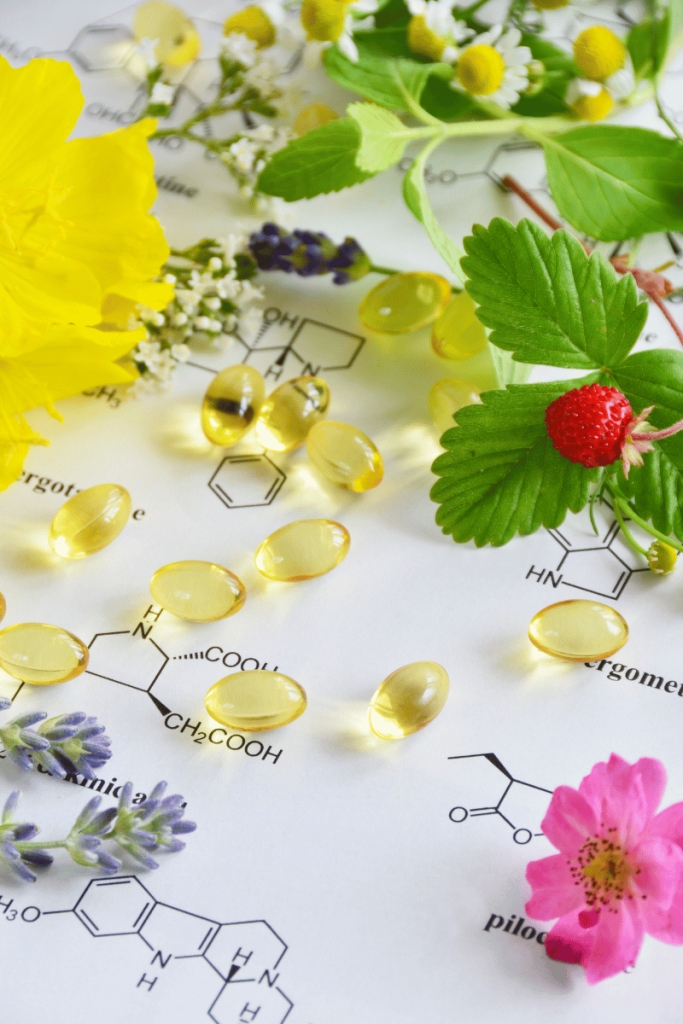
Advantages of Using Herbs Over Synthetic Medications
While synthetic medications have their place in modern healthcare, there are distinct advantages to using herbal remedies for endocrine health. Firstly, herbs are often gentler on the body and less likely to cause adverse side effects compared to synthetic drugs. Many pharmaceutical medications come with a long list of potential side effects, whereas herbs typically have a milder impact and are better tolerated by most individuals.
Additionally, herbs offer a holistic approach to health, addressing not only specific symptoms but also supporting the body’s overall balance and vitality. Unlike single-target drugs, many herbs contain a complex array of bioactive compounds that work synergistically to promote health and well-being. Moreover, herbs are often more affordable and accessible than prescription medications, making them a viable option for individuals seeking natural alternatives.
By harnessing the power of herbal remedies, individuals can support their endocrine system’s health and vitality gently and sustainably, while also honoring the wisdom of traditional healing practices.
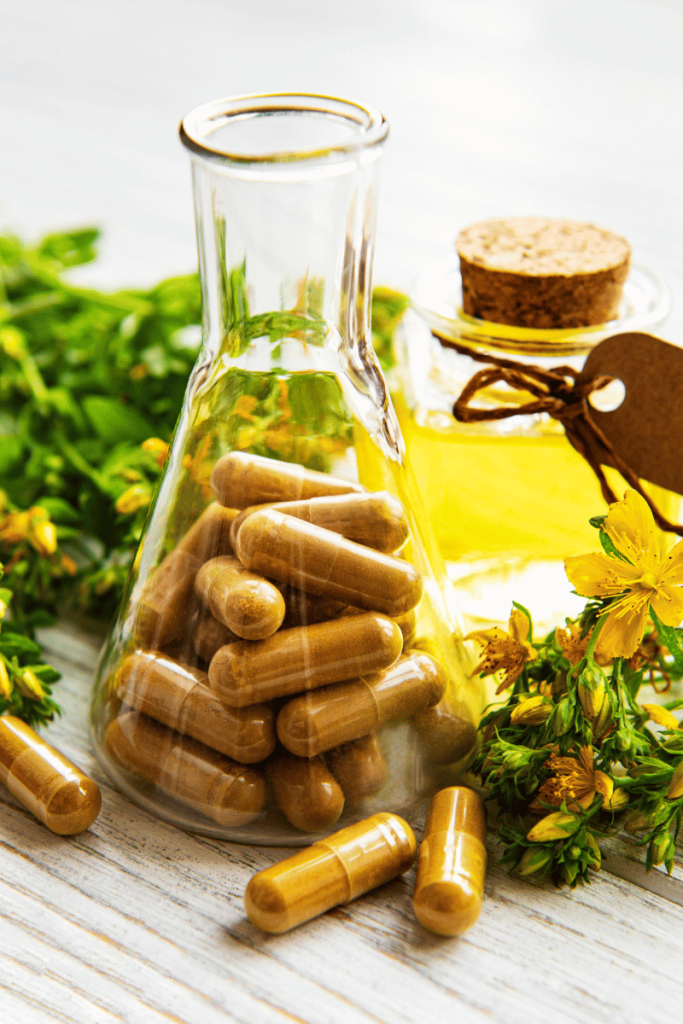
Top Herbs for Endocrine System Health
The herbs listed here are the most common and readily available of what has been mentioned already. I have chosen two herbs from each herbal category (adaptogen, bitters, alterative, and nervine).
Ashwagandha
Ashwagandha (Withania somnifera), is a revered herb in Ayurvedic medicine for its adaptogenic properties, along with nervine and an adrenal tonic. It helps the body adapt to stress and promotes energy and vitality while supporting the adrenal glands and promoting hormonal balance. Ashwagandha has been shown to reduce cortisol levels, alleviating stress and anxiety.
Additionally, it may enhance thyroid function by boosting the conversion of T4 (thyroid storage hormone) to T3 (the active thyroid hormone), making it a valuable ally for those seeking to support their endocrine health naturally. Ashwagandha is also used after recovering from a long term debilitating disease.
It should not be used during pregnancy as it can lead to a miscarriage. It is contraindicated in those sensitive to the nightshade family.
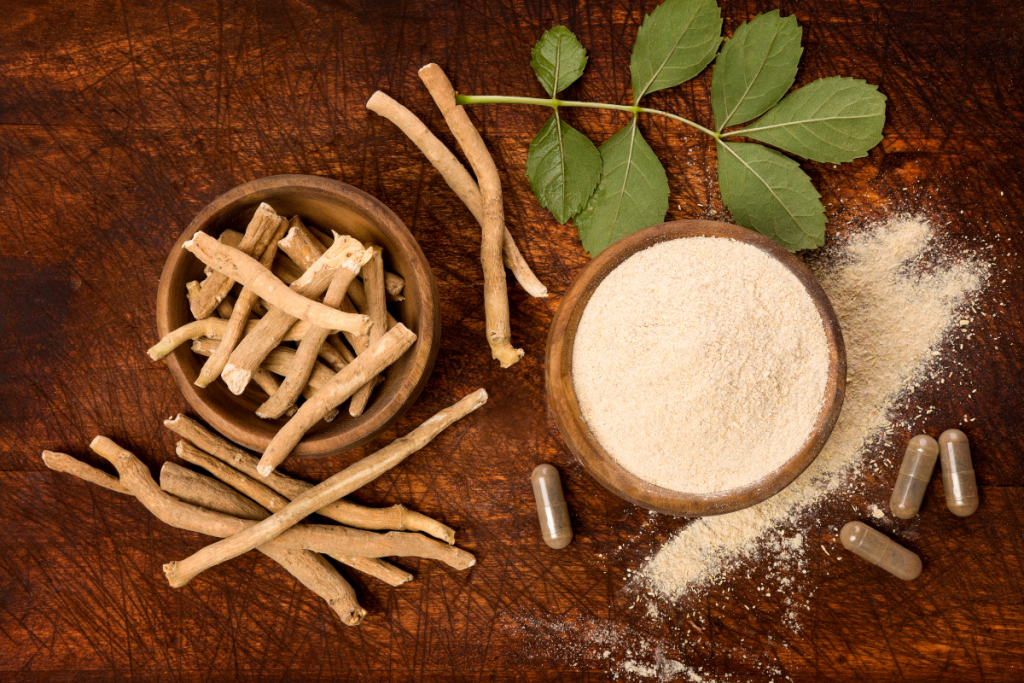
Holy Basil
Holy basil (Ocimum sanctum), is considered a sacred herb in Ayurvedic tradition and is renowned for its medicinal properties. It is rich in antioxidants and has been shown to reduce inflammation, support the immune system, and promote overall well-being. Holy basil also exhibits adaptogenic properties, helping the body cope with stress and promoting hormonal balance. It is often used to support adrenal function by preventing adrenal fatigue and alleviating symptoms of anxiety and fatigue.
Holy basil is shown to help protect the heart from stress, lower blood pressure, and cholesterol, and stabilize blood sugar levels. It can lessen the excessive immune response in conditions like hay fever (allergic rhinitis) and asthma. Holy basil can also help clear brain fog and improve memory concentration and mental acuity.
No known warnings.
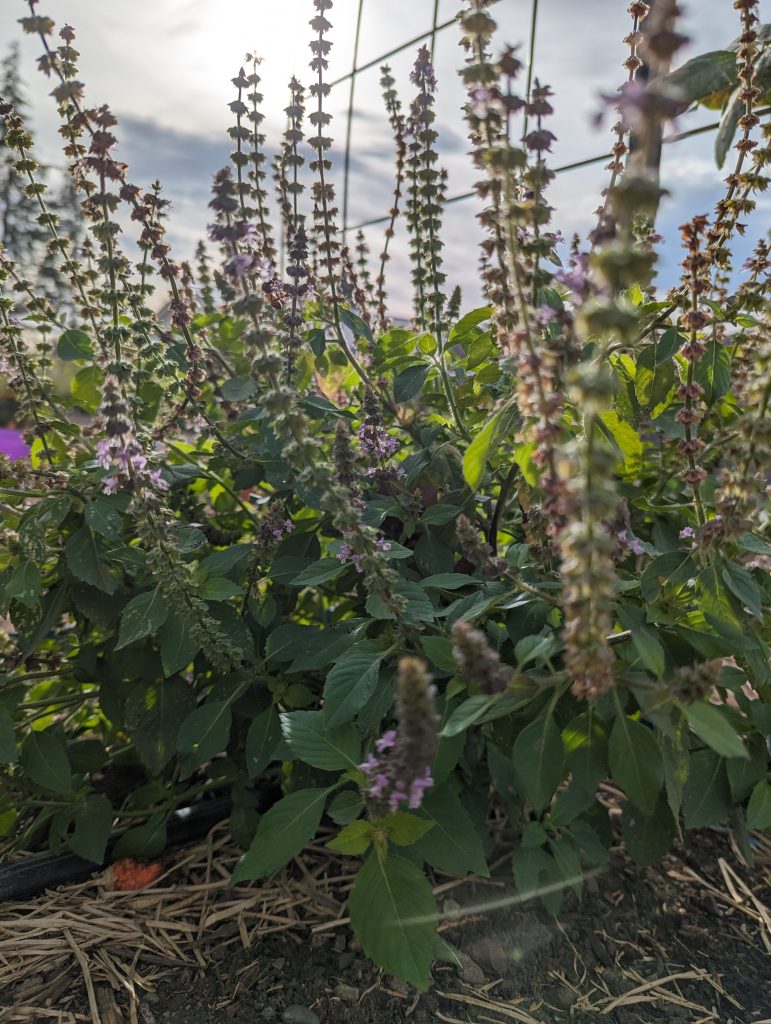
Dandelion Root
The dandelion (Taraxacum officinale) root, derived from the common dandelion plant, is prized for its detoxifying properties and its ability to stimulate bile flow and support liver function. The liver plays a crucial role in hormone metabolism and detoxification, making dandelion root an excellent herb for promoting endocrine health. It helps eliminate toxins from the body, which can support hormonal balance and overall vitality.
Additionally, dandelion root has diuretic properties, aiding in the elimination of excess fluids and promoting urinary tract health.
No known warnings.
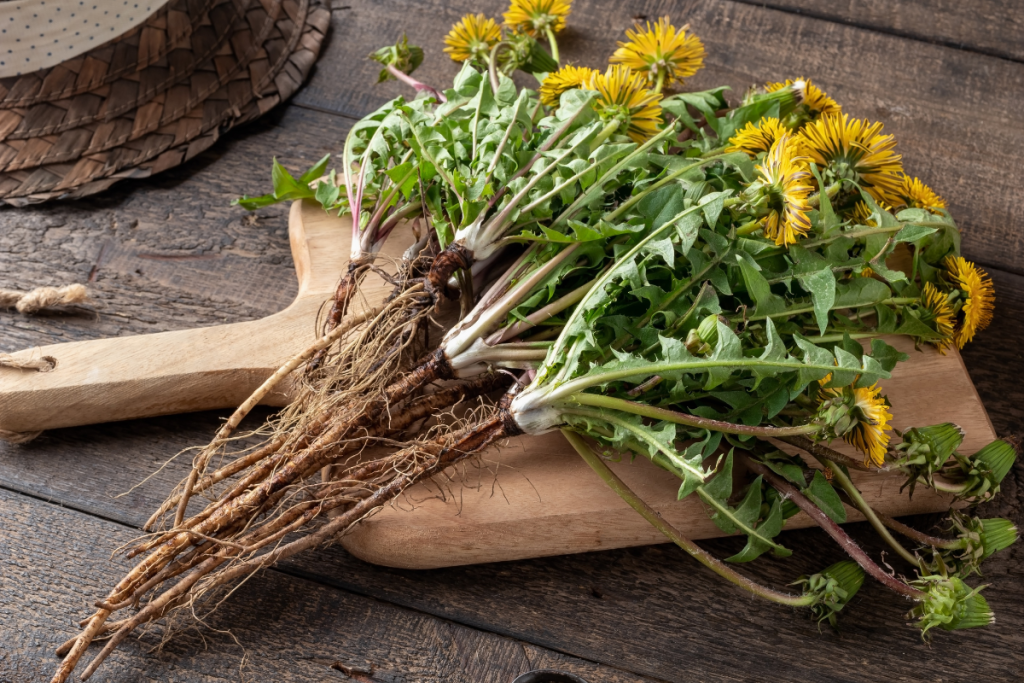
Horehound
Horehound (Marrubium vulgare), is a bitter herb that has been used in traditional medicine for centuries. It is valued for its ability to support respiratory health and soothe coughs and throat irritation. However, horehound also exhibits alterative properties, meaning it can help “cleanse” the blood and support the body’s natural detoxification processes.
By supporting liver function and promoting detoxification, horehound can indirectly support endocrine health.
Use with caution during pregnancy.
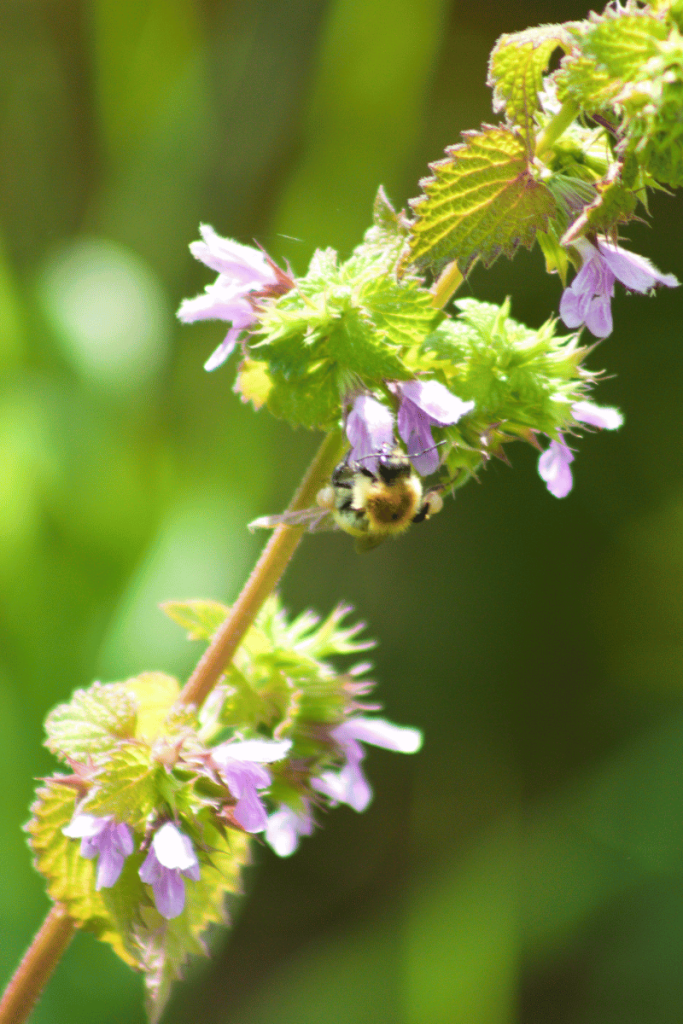
Burdock Root
Burdock (Arctium lappa) root, derived from the burdock plant, is a versatile herb known for its purifying and nutritive properties. It is rich in antioxidants and contains compounds that support liver function and detoxification. It is also good at cleansing the blood of toxic elements. Burdock root is often used to promote clear, healthy skin and support the body’s natural detoxification processes. Whenever you’re working to clear the liver and blood (detoxifying), your skin will often break out, which means the process is working. It should clear once detoxification is completed.
By supporting liver health, burdock root indirectly supports hormonal balance and overall endocrine function.
No known warnings.
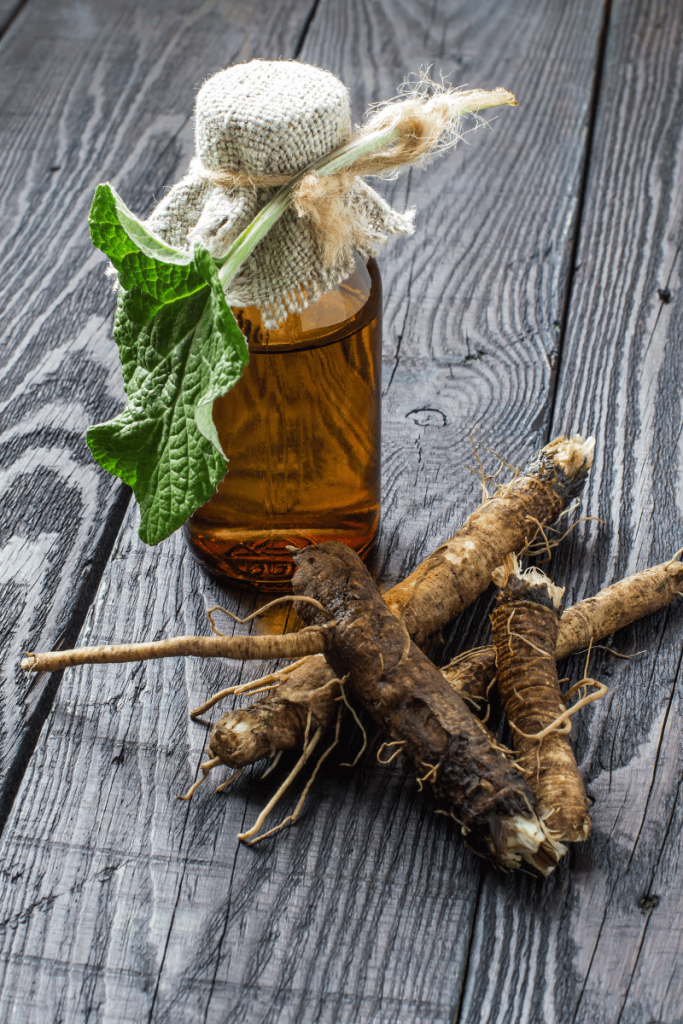
Cleavers
Cleavers (Galium aparine), is a diuretic herb that has been used in traditional medicine to support kidney and urinary tract health. It is valued for its ability to promote the elimination of excess fluids and toxins from the body. Cleavers also exhibit alterative properties, helping to purify the blood and support the body’s natural detoxification processes. By doing so, they can help to reduce skin inflammation and swollen lymph nodes.
By promoting kidney function and detoxification, cleavers may indirectly support endocrine health.
No known warnings.
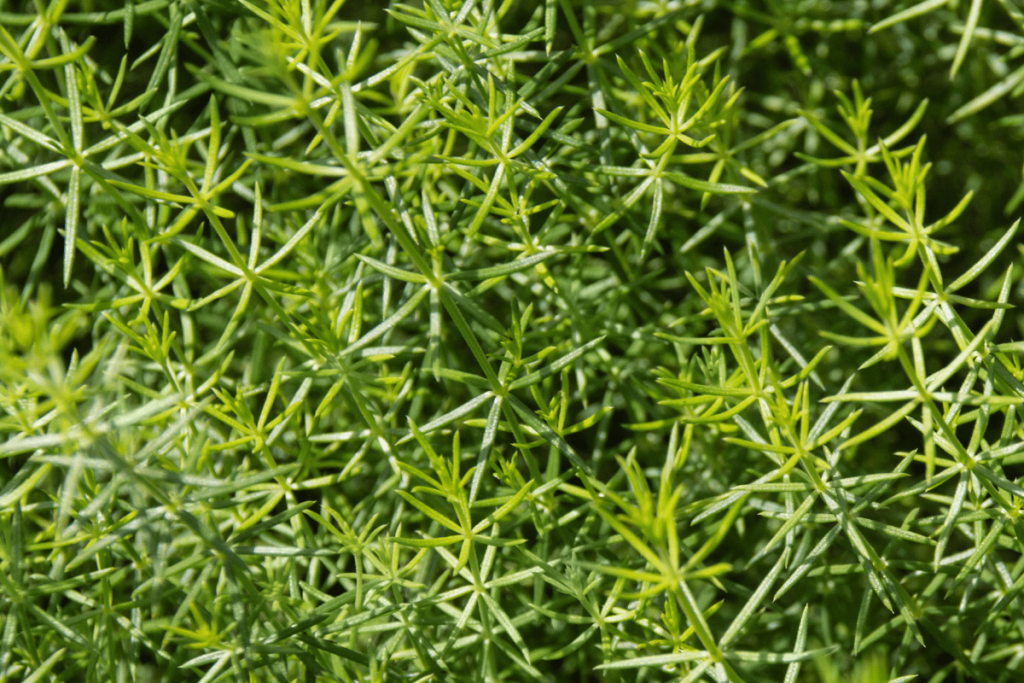
Chamomile
Chamomile (Chamomilla recutita, Matricaria recutita) derived from the Matricaria chamomilla plant, is a gentle herb known for its calming and soothing properties. It has been used for centuries to promote relaxation, relieve stress, and support healthy sleep patterns. Chamomile also exhibits nervine properties, helping to calm the nervous system and alleviate symptoms of anxiety and tension.
By promoting relaxation and reducing stress, chamomile may indirectly support hormonal balance and overall endocrine health.
Allergic reactions are not common but do still happen sometimes.
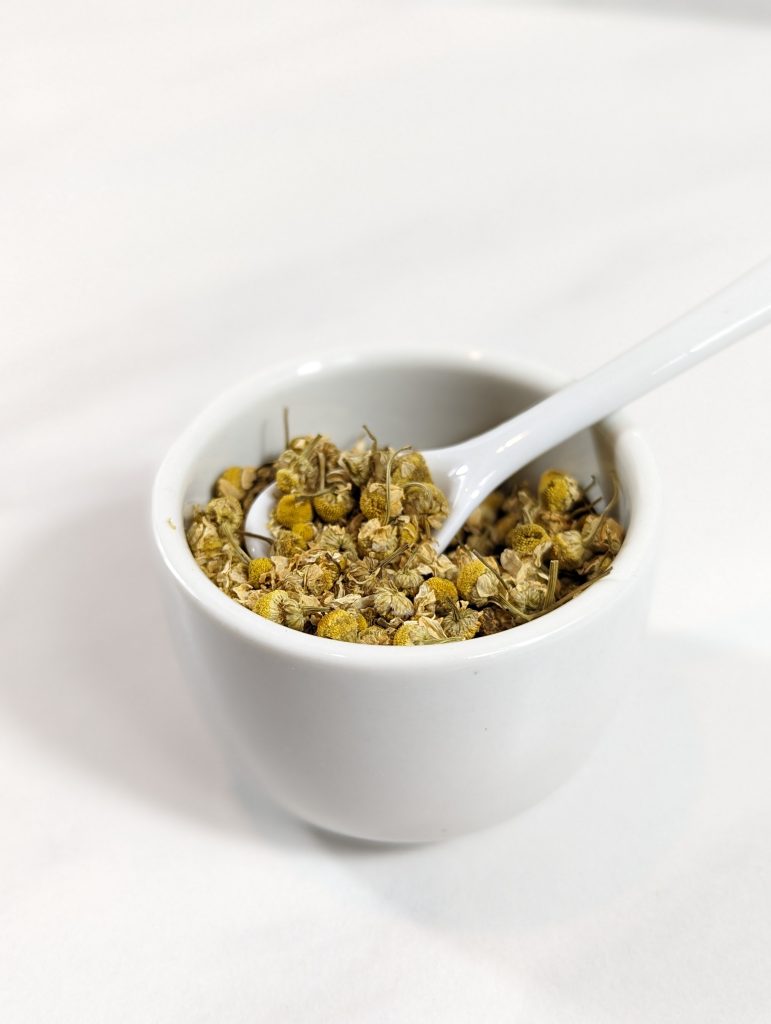
Passionflower
Passionflower (Passiflora incarnate, P. quadrangularis) is a beautiful vine with a long history of use in traditional medicine. It is valued for its calming and sedative properties, making it a popular herb for promoting relaxation and reducing anxiety. It also exhibits nervine properties, helping to calm the nervous system and promote healthy sleep patterns. Passionflower is used for restless agitation and exhaustion, with or without muscular twitching.
By reducing stress and promoting relaxation, passionflower may indirectly support hormonal balance and overall endocrine health.
No known warnings.
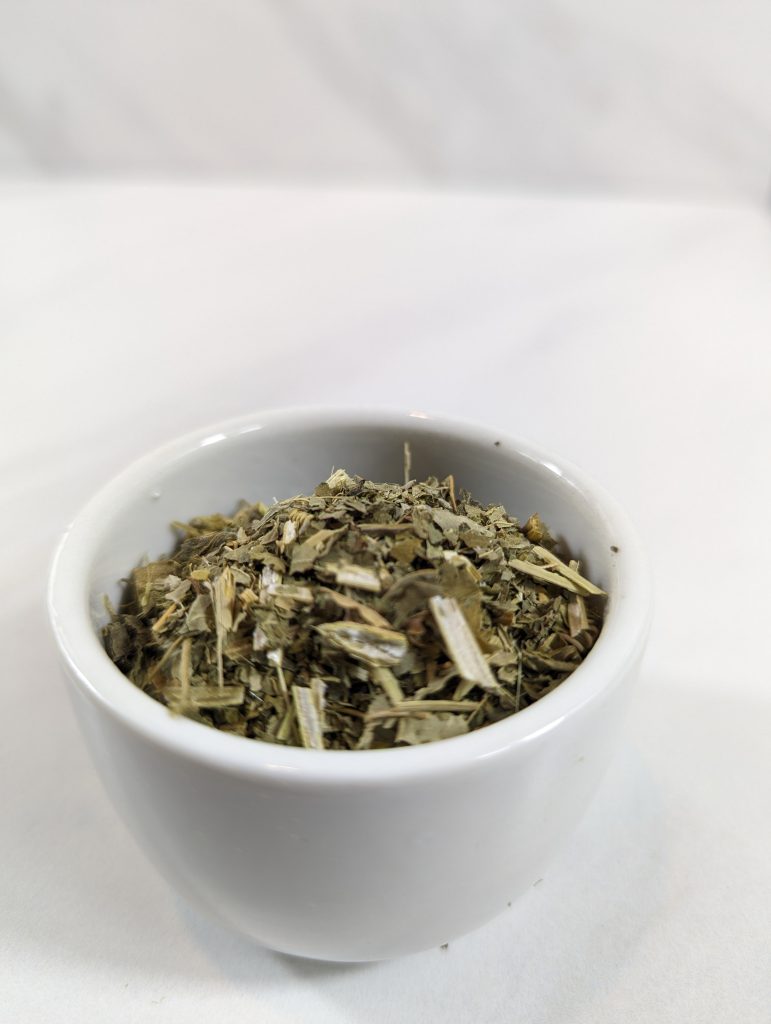
Safely Using Herbs and Consulting with a Medical Professional
While herbs can offer valuable support for endocrine health, it’s essential to approach their use with caution and mindfulness. Before incorporating any new herbs into your wellness routine, it’s crucial to consult with a qualified healthcare professional, especially if you have any underlying medical conditions or are taking medications.
Consultation with a Healthcare Professional
Before starting any herbal regimen, it’s important to discuss your health goals and concerns with a healthcare provider, such as a naturopathic doctor, herbalist, or physician. They can offer personalized guidance based on your individual health history, current medications, and unique needs. Additionally, they can help you determine the appropriate dosage and duration of use for specific herbs.

Considerations for Medical Conditions
Certain medical conditions may interact with herbs or require adjustments to their use. For example, individuals with thyroid disorders should exercise caution when using herbs like ashwagandha and holy basil, as they may affect thyroid function. Similarly, individuals with diabetes should monitor their blood sugar levels carefully when using herbs like fenugreek and cinnamon, which can lower blood sugar levels. Consulting with a healthcare professional can help you navigate these potential interactions and ensure safe and effective use of herbs.
Dosage and Duration of Use
Even natural remedies can have side effects or interactions, especially when used in high doses or for extended periods. It’s important to follow recommended dosage guidelines and avoid exceeding the recommended intake without consulting a healthcare professional. Additionally, it’s advisable to use herbs intermittently or in cycles to prevent tolerance or dependence.
Monitoring for Adverse Reactions
While herbs are generally considered safe when used appropriately, it’s essential to pay attention to any changes in your health or well-being when starting a new herbal regimen. Be vigilant for signs of allergic reactions, digestive upset, or other adverse effects, and discontinue use if any concerns arise. If you experience severe or persistent symptoms, seek medical attention promptly.
Quality and Safety of Herbal Products
When purchasing herbal supplements or preparations, choose reputable brands that adhere to high-quality standards and undergo rigorous testing for purity and potency. Look for products that bear third-party certifications or are manufactured in facilities that follow Good Manufacturing Practices (GMP).
By approaching herbal use with caution, mindfulness, and informed guidance from healthcare professionals, individuals can utilize medicinal herbs while minimizing risks and maximizing their beneficial effects. Remember that every individual is unique, and what works for one person may not be suitable for another. With proper care and attention, herbs can be valuable allies in supporting endocrine health and overall well-being.
Sourcing High Quality Herbs
Ensuring the quality and purity of the herbs you use is essential for their safety and efficacy. Here are some tips for sourcing high-quality herbs. Also, make sure to check out my resource page for where I source my herbs and other products.
Research Reputable Suppliers
Look for suppliers that specialize in providing herbs and herbal products. Reputable companies often have a strong commitment to quality and transparency. Check for certifications such as Good Manufacturing Practices (GMP), organic certification, or third-party testing to ensure the herbs meet stringent quality standards.
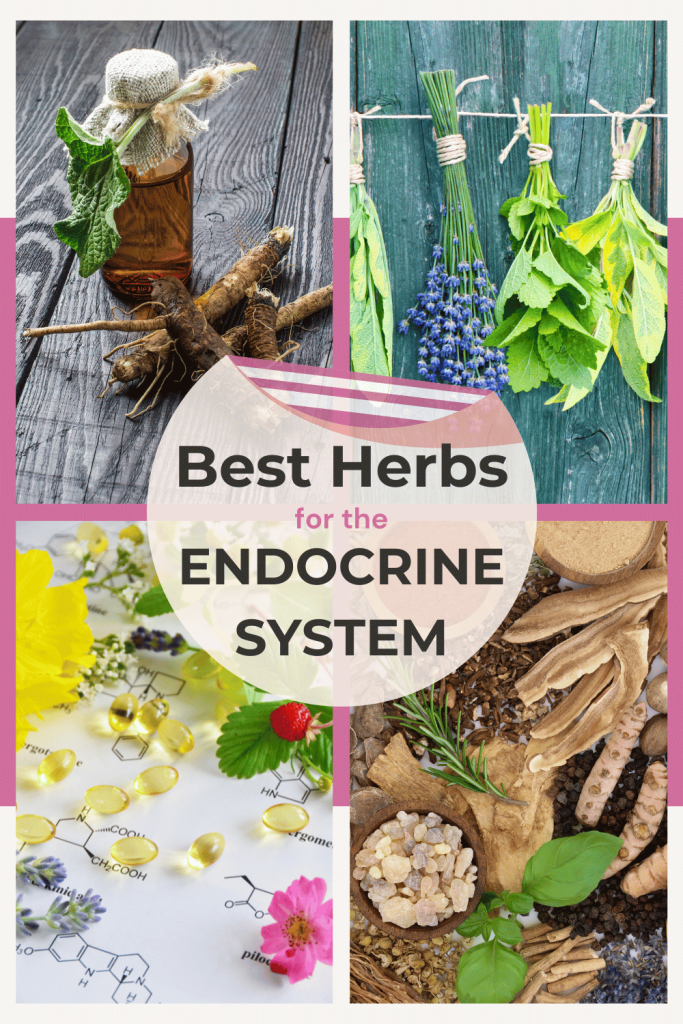
Choose Organic and Wildcrafted Herbs
Organic herbs are grown without synthetic pesticides, herbicides, or fertilizers, reducing the risk of pesticide residues and ensuring a higher level of purity. Wildcrafted herbs are harvested from their natural habitat sustainably and ethically, preserving their potency and integrity. Look for organic and wildcrafted certifications when purchasing herbs.
Check for Sustainable Sourcing Practices
Sustainability is crucial when sourcing herbs to ensure the long-term viability of plant populations and ecosystems. Look for suppliers that prioritize sustainable sourcing practices, such as cultivating herbs in harmony with the environment, supporting fair trade initiatives, and protecting endangered plant species.
Examine Packaging and Storage
The quality of herb packaging and storage can impact the freshness and potency of the herbs. Choose herbs packaged in airtight containers, such as glass jars or foil-lined pouches, to protect them from light, air, and moisture. Properly stored herbs should be kept in a cool, dry place away from direct sunlight.
Consider Whole Herbs vs. Extracts
While both whole herbs and extracts can be beneficial, whole herbs often retain a broader spectrum of phytochemicals and nutrients. However, extracts can offer concentrated doses of active compounds and may be more convenient for certain applications. Choose the form of herbs that best suits your needs and preferences.
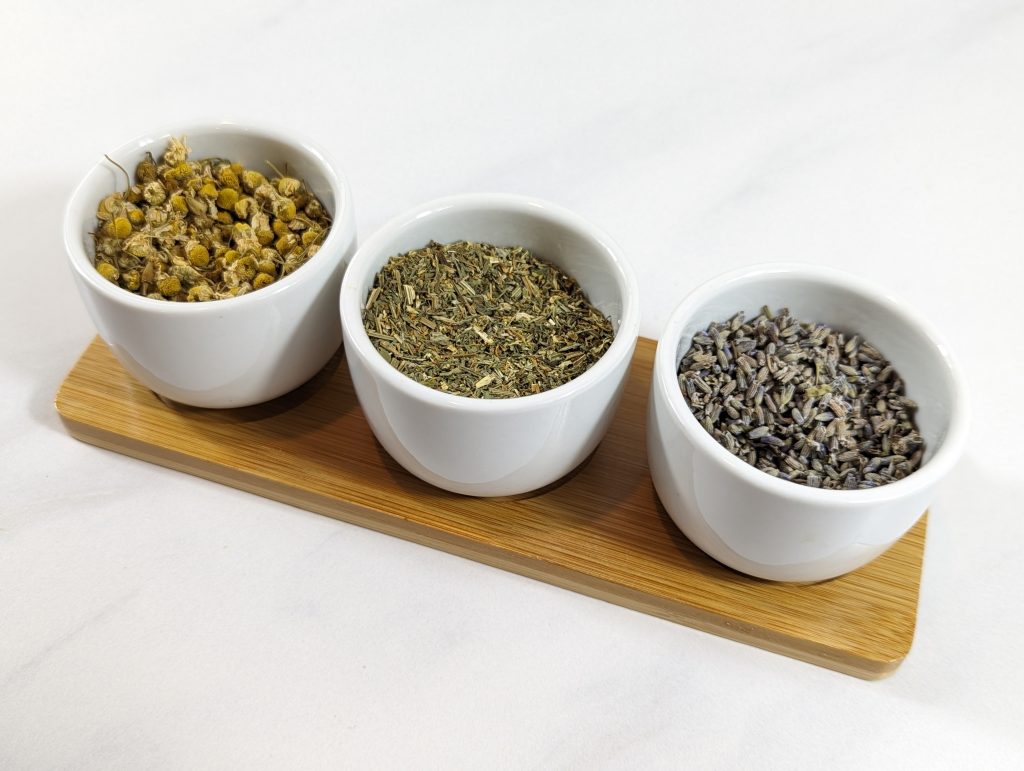
Overall, These are the Best Herbs for the Endocrine System
The endocrine system serves as a vital regulator of numerous bodily functions, from metabolism and growth to mood and reproduction. Maintaining a balanced endocrine system is essential for overall health and well-being, as disruptions in hormone levels can lead to a variety of health issues.
Exploring herbal remedies for endocrine health presents a natural and holistic approach to supporting the body’s hormonal balance. The herbs discussed – ashwagandha, holy basil, dandelion root, horehound, burdock root, cleavers, chamomile, and passionflower – offer a wealth of therapeutic benefits, from supporting adrenal function and hormone metabolism to promoting relaxation and stress relief. Incorporating these herbs into your wellness routine can provide gentle yet effective support for your endocrine system, helping to restore balance and vitality.
Furthermore, the potential of herbs extends beyond mere symptom management; they offer a holistic approach to health that addresses the root cause of imbalances and promotes overall well-being. By harnessing the power of nature’s remedies, individuals can take an active role in supporting their endocrine health and fostering a greater sense of vitality and resilience. As we continue to delve into the realms of traditional wisdom and scientific research, the potential of herbs to support our health and well-being remains vast and promising. Embracing herbal remedies for endocrine health is not only a testament to our reverence for nature’s healing gifts but also a profound step towards cultivating vibrant health and vitality from within.
